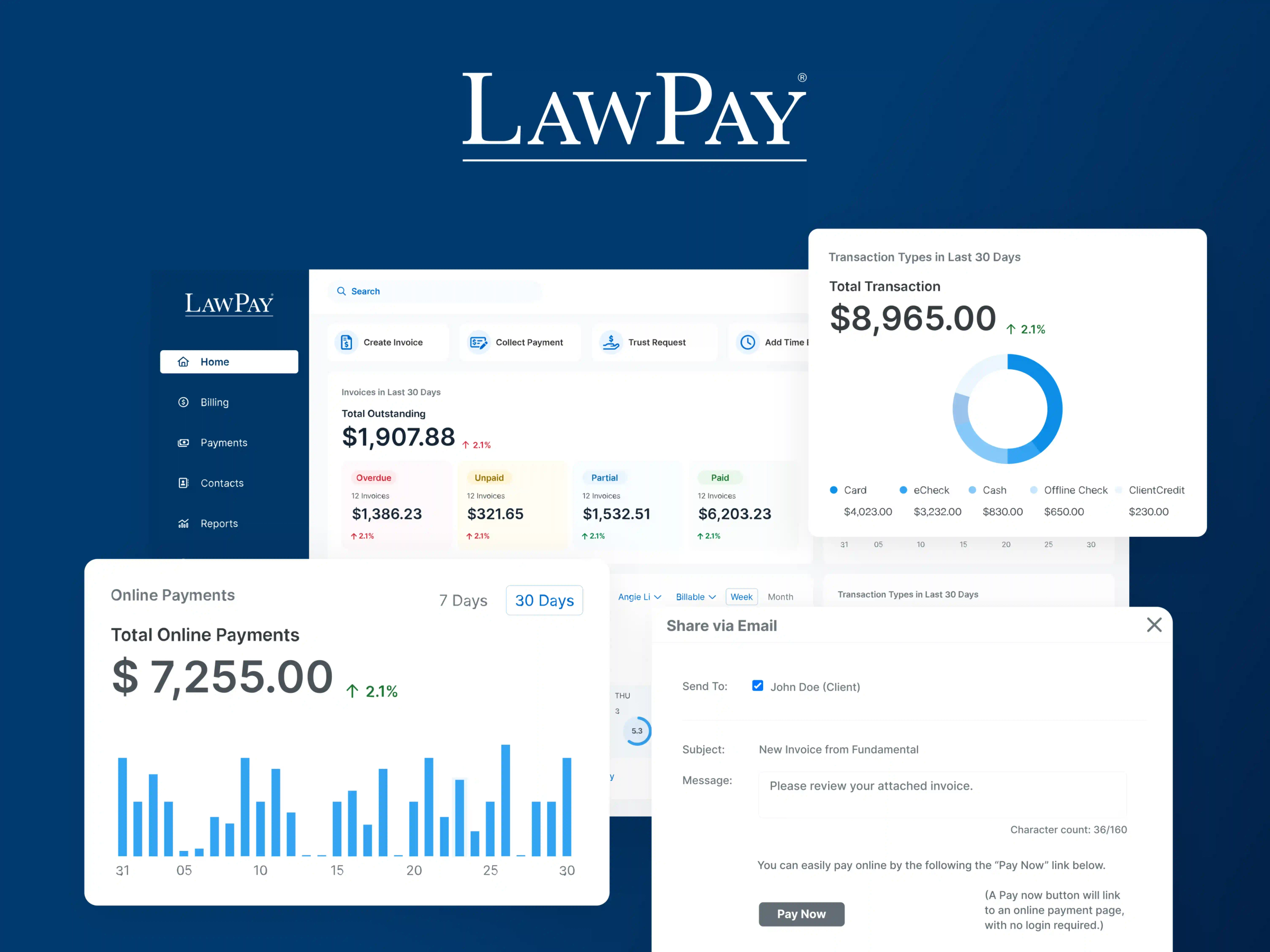Key takeaways
Digital wallets are apps that let clients store payment information and make secure transactions from their phone or computer.
For law firms, they create a faster, more flexible way to accept payments without relying on checks or cash.
Offering clients the option to pay through digital wallets increases convenience and helps boost collection rate and cash flow.
Digital wallets are a modern payment method that can help your firm spend less time chasing invoices and free up more time to focus on your practice.
Our 2025 Legal Industry Report found that 82% of firms now accept credit or debit cards online, up from 78% the year before. Plus, more than half of the surveyed firms said it boosted their collection rates, and a third saved hours each month on billing tasks.
Still, many law firms struggle with slow checks, late payments, and extra admin work since they use outdated payment methods. These issues hurt your cash flow and take time away from practicing law. That’s why more law firms are turning to digital wallets.
Learn about digital wallets, their benefits, and best practices to ensure payments work better for you and your clients.
How do digital wallets work for law firms?
Digital wallets let your clients pay using their phones instead of pulling out cash or a physical card. For law firms, it’s simply another secure way to accept mobile payments and even let clients use features like tap to pay.
Here’s how you can use digital wallets:
Your firm sets up a payment system that supports digital wallets.
A client opens their mobile wallet, such as Apple Pay or Google Pay, on their phone.
They either tap their phone at checkout or use the wallet to pay through a secure link online.
The payment processes instantly, and funds flow to your firm just like a normal card payment.
Unlike traditional credit card payments, where the card has to be physically swiped or entered online, digital wallets use encrypted tokens. That means no card number is shared, making the process faster and safer.
Examples of digital wallets
Many contactless payment options are available today, but only a few stand out as the most common and trusted. To pick the best option for your firm, research which wallets your clients will most likely use and how each fits into your professional billing.
Here are some of the top options for digital wallets for law firms:
Use case for law firms | Considerations | |
8am™ LawPay | Compliance-ready billing and managing trust/IOLTA accounts | Specifically designed for legal use, the strongest choice for law firms |
Apple Pay | iPhone users making quick payments | Limited to Apple devices; not all clients use it |
Google Pay | Supports online and in-person payments for Android users | May require setup for in-person acceptance |
Venmo | Clients who prefer peer-to-peer apps | Not designed for legal compliance; more informal |
PayPal | Online payments; familiar to many clients | Fees can add up; not built for legal trust accounting |
How can law firms use digital wallets effectively?
You can use digital wallets effectively by pairing convenience with strong safeguards. While these tools speed up payments, they also come with risks such as fraud, unauthorized access, or mishandling of client funds.
To get the benefits without the drawbacks, you can use a secure payment system and adopt practices that protect both you and your client.
Choose a compliant payment processor
Compliance is the foundation of safe payments. For law firms, following the American Bar Association (ABA), Interest on Lawyers’ Trust Accounts (IOLTA), and PCI DSS standards ensures client funds are protected and properly managed.
For example, IOLTA compliance means retainer funds are kept in the correct IOLTA account instead of being mixed with operating money.
You can use a legal payment solution, like LawPay, to simplify things, since it was designed with these standards in mind, making it a trusted choice for firms that want both ease and compliance in one platform.
Learn more about LawPay payment solutions
Protect client data with encryption and authentication
For law firms, security is key. Modern electronic payment solutions that use tokenization help facilitate safe transactions by creating sensitive card details with unique codes.
Encryption is another important feature, which scrambles data during transfer. Add multi-factor authentication, and you have layers of protection that make it far harder for bad actors to gain access.
For example, if a client pays through a digital wallet, tokenization ensures their actual card number is never exposed, even if a system were compromised.
Follow ethical handling and trust accounting guidelines
Digital wallets don’t change the ethical rules, which means it’s still important to separate and record your funds accurately. Compliance requirements also still include avoiding commingling, keeping detailed records, and always following state bar rules.
For example, if a client pays a retainer, that money goes into the trust account until it’s earned. Operating funds go elsewhere. Digital wallets can help speed up the transfer, but the same trust accounting rules apply.
Integrate digital wallets into billing workflows
Integrating digital wallets into everyday processes makes payments more efficient and convenient for everyone. You can add them directly to invoices, client portals, or even recurring payments.
For instance, you might set up recurring retainer payments through your law firm billing system. This could save your staff from sending manual reminders and let clients pay with one tap.
Educate and guide clients
Not every client is tech-savvy, so guidance helps reduce friction. Sending step-by-step instructions with invoices or offering a short how-to guide can ensure clients know how to pay quickly and securely.
For example, you can include a link showing how to complete a mobile wallet payment. This simple step keeps payments smooth and prevents delays.
Train your staff and internal teams
Training helps your staff handle disputes, answer questions, and avoid errors when handling digital wallets.
Some firms create internal protocols that outline what to do if a payment fails, how to confirm funds were allocated correctly, and when to escalate unusual activity. With proper training, your team can prevent mistakes and maintain client trust.
Guide
Upgrading the Client Experience with Online Payments: 5 Stories from Real Law Firms
Download now
What are the benefits of digital wallets for law firms and clients?
Using digital wallets can help clients pay your firm faster, easier, and more reliably. Here are some of the key advantages of accepting digital wallets for payments:
Faster payments and fewer overdue invoices: Clients can pay instantly with a tap or click, reducing delays that come with checks or manual transfers.
Improved cash flow and easier reconciliation of client payments: Funds move quickly into your accounts, making it simpler to track balances and keep your books accurate.
Enhanced client convenience with multiple payment options: Clients can use the wallet they already prefer, whether Apple Pay, Google Pay, or another trusted option.
A professional, modern firm image that appeals to clients: Offering digital wallets shows your firm is up to date with technology and focused on client service.
Less administrative time spent chasing payments: Automated processing and reminders reduce the need for staff follow-ups.
Higher client satisfaction and a stronger chance of repeat business: A smooth, stress-free payment experience builds trust and encourages long-term relationships.
Using digital wallets for frictionless payments removes barriers for clients and helps you build systems that optimize your cash flow.
Why LawPay is the trusted choice as a law firm digital wallet
Digital wallets can give your firm faster payments, but it’s also important to prioritize compliance, trust accounting, and security. That’s where LawPay stands out. It’s designed specifically for lawyers, helping you accept mobile and online payments while protecting client funds and following all ethical rules.
Sign up today to join 150,000+ lawyers who trust LawPay for their transactions and enjoy faster payments, stronger compliance, and happier clients.
Schedule a demo to see what LawPay can offer your firm.
Get a demo
About the author
Adrian Aguilera is a Senior Content Writer and SEO Strategist for 8am, a leading professional business platform. With over a decade of experience, he covers emerging legal technology, financial reporting for law firms, accounting, the latest industry trends, and more.

